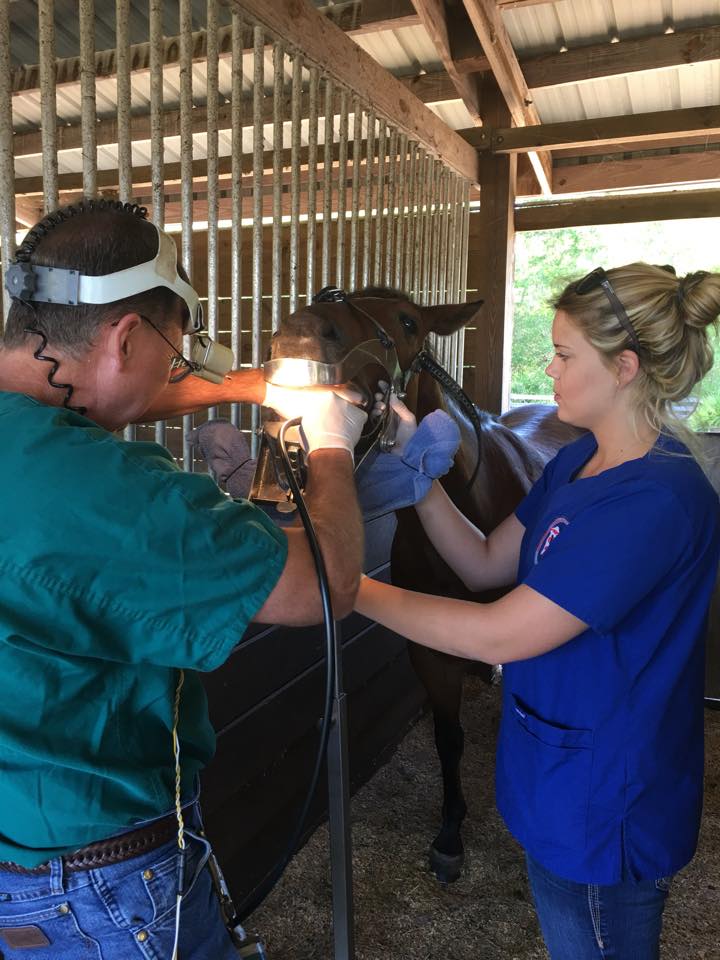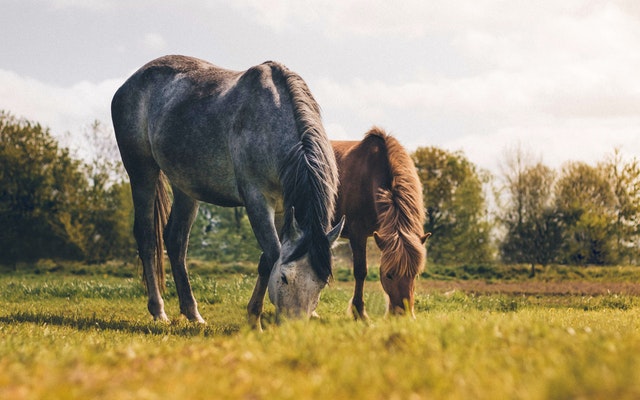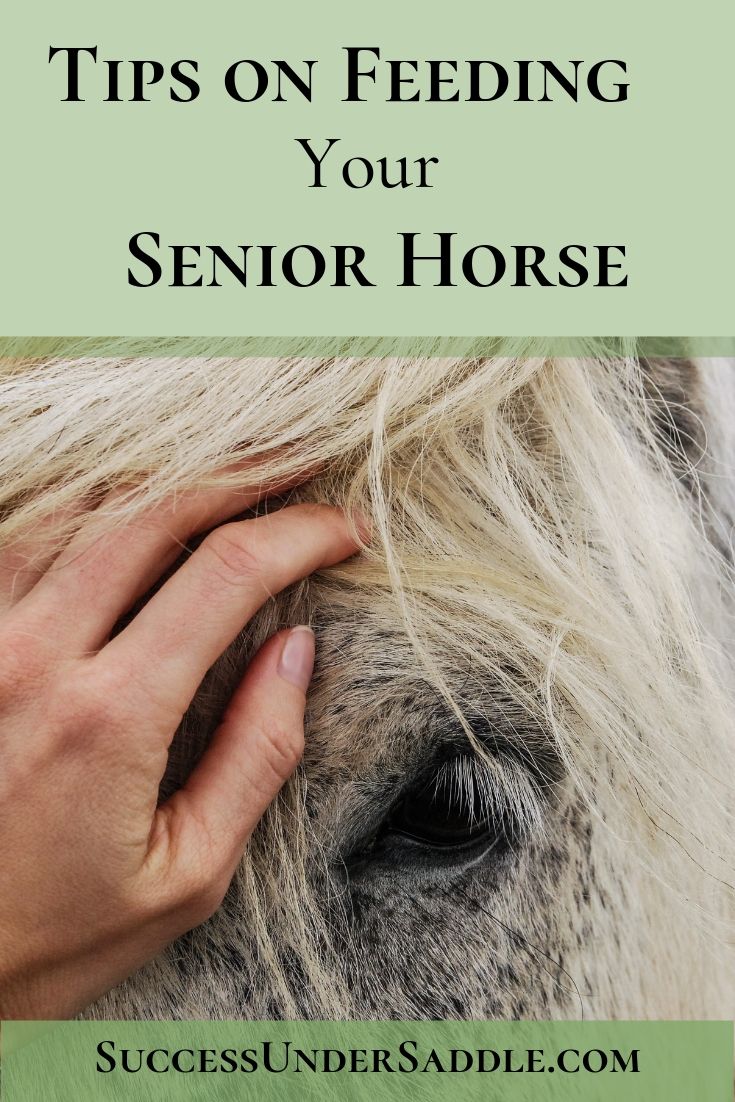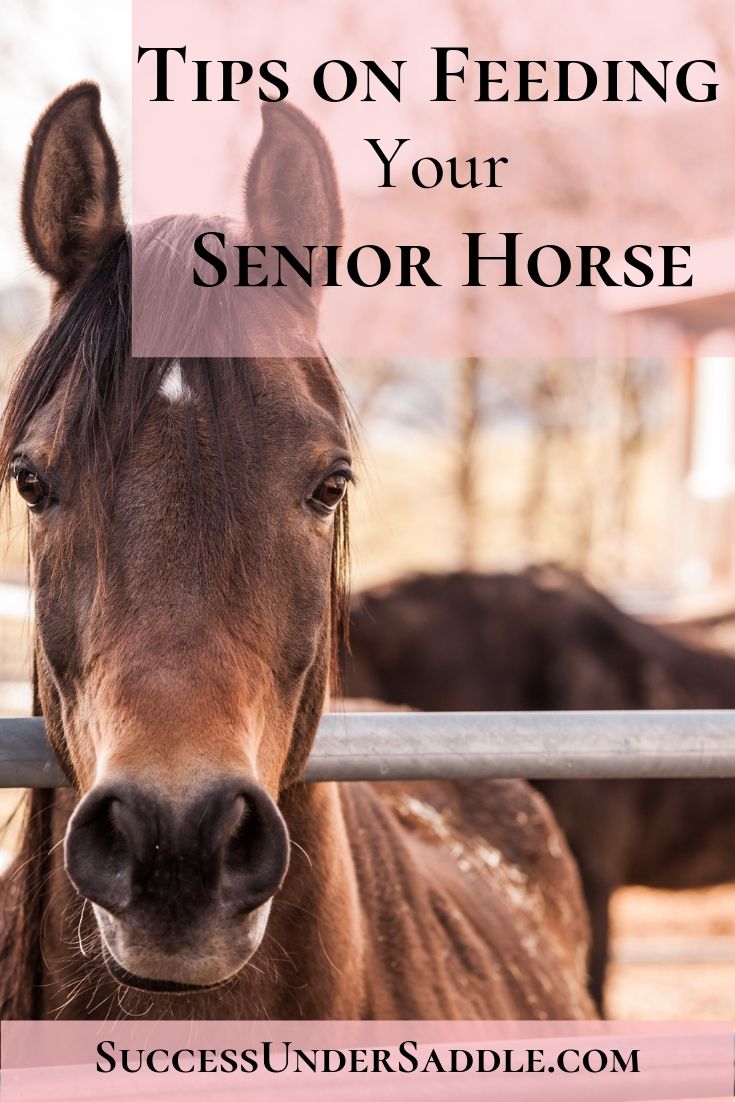This post may contain affiliate links. Please read our disclosure for more info.
Feeding the older, senior horse has its own challenges. All of us have that special horse that has become part of the family and is our “forever horse”. When you care for your horse every day, you may not notice slight variations in his body condition as he ages. Weight loss is often the most visible sign that our horse has entered into old age.
Older senior horses sometimes lose weight for inexplicable reasons, even if they appear to be in good health and have good appetites. Reversing weight loss after the horse has become thin is much more difficult than if it was caught at an earlier stage. Below are some tips on feeding the older or senior horse.
Ensuring proper nutrition for your senior horse is the number one thing you can do to ensure a long, healthy life. Whether it’s due to dental problems, reduced digestive efficiency or inappropriate nutrition, horses over age 20 become less able to process and absorb the energy needed to keep them in full flesh. Weight gain, on the other hand, may occur when retirees from rigorous training or competition continue to eat as usual.
Obesity is no healthier than being underweight. Excess weight stresses arthritic joints, strains soft tissues and exacerbates age-related problems. Sometimes of the appearance of weight loss is an illusion caused by the changing shape and reduced muscularity of his older body.
Hay and Pasture
Roughage in the form of pasture, hay or both is the cornerstone of a healthy diet. It is a vital part of your horse’s diet, and without proper amounts, can cause problems in the digestive tract.
Older horses seem to do better on fresh green pasture grass even if they have lost some molars because grass is easily chewed and digested. However, most of us must supplement our horses’ diets with hay since few areas of the country allow for high-quality grazing year-round.
If your situation does not allow for a lot of turn out time, the next best option is supplying a grass hay, such as timothy, brome grass and orchard grass, These hays are more digestible than stemmy hays, such as alfalfa or over-mature grass. Quality matters too. If your hay and pasture are poor, then your horse is getting fiber but may not be getting adequate calories or nutrients.
Choose the highest quality hay you can find in your area. Look for green, leafy hay with a minimum of brown stalks and mature seed heads. One quick test of the quality of hay is to squeeze a handful. Stiff stalks that hurt your palm are not a good choice when you need a higher calorie feed. An extension agent can help you assess the nutritional value of your pasture and hay.
Problems tend to happen when an older horse is asked to get its roughage from hay only. When the teeth are not in good condition, an older horse may not be able to properly grind hay to be adequately digested for energy and other nutrients. Signs that eating hay may be a problem for your horse are low intakes of hay or rolling and wadding of hay in the mouth. If this is the case, there are alternative fiber sources for horses available on the market.
Alternative Hay Sources
Hay cubes are one option and come in a variety of grass and alfalfa mixes. I’m not a fan of the large hay cubes, I think horses could choke on them, but I have used the mini-alfalfa cubes. If you find hay cubes too large or too hard for your older horse, then covering them with water will soften them.
Chopped and bagged forages are made from hay that has been cut in 1/2 to 1 inch pieces and are available in grass/alfalfa mixes or straight alfalfa. Chopped hay can be dusty, so dampening it before serving may be helpful, particularly for horses with respiratory problems. Hay pellets are another option that brings the particle size down so they are even more easily digested.
A horse needs to eat a daily ration of 2 to 3 percent of his body weight each day to maintain a healthy weight. Of that, at least 1.5 to 2 percent needs to be some form of forage. That means two pounds of total feed for every 100 pounds that he weighs, or 20 pounds for a 1,000-pound horse just for maintenance. More will be needed for weight gain.
To help your horse gain weight, Sarah Ralston, a leading equine nutritionist suggests increasing his current forage ration until his total feed reaches at least 2.5 percent of his desired body weight. In other words, if your horse currently weighs 1,000 pounds, and you’d like him to be 1,100, then your target would be 2.5 percent of 1,100, or 27.5 pounds of hay.
Feed and Grain
“Senior” feeds are scientifically formulated in grain-only formulations to be fed with grass/hay or in “complete” formulations containing both concentrates and roughage and may simplify the dietary management of older horses. Most of these rations contain approximately 12 to 14 percent protein and 14 to 20 percent fiber.
Senior feeds also have the added digestive benefit of being extruded — cooked and processed into a paste, then puffed up into pelleted form which makes them easier for the older horse to chew. Fat (4 to 6%) can also be added to increase the energy value of the feed.
According to Dr. Ralston, senior feeds help the older horse absorb protein and carbohydrates better. To further improve the digestibility of feed, particularly for horses with missing or nubby teeth, she suggests wetting the feed before serving it.
If you put warm water on any of these pelleted or extruded senior feeds they will make a slurry mixture in about 10 minutes. Soaking the feed reduces the chance that the horses will choke and has the added benefit of getting extra water into them.
Beet pulp is another good fiber source that can be soaked, making it easily chew-able. According Ralston, beet pulp is a good substitute for grain because “it is largely digested in the large intestine, the way nature intended digestion to proceed.”
Dietary changes should be made gradually for any horse, but it’s even more important for aged horses. Introduce new feed by mixing increasing amounts of the replacement ration with decreasing amounts of the old feed. Experts advise taking three weeks to complete the changeover.
Water Intake
Ample fresh water, of course, is essential year-round. Loss of appetite is one of the effects of dehydration. Installing heaters or taking other steps to prevent water buckets from freezing in winter is crucial, and in the summer, moving some of the outside sources into the shade can help to keep it more palatable.
During cold weather, a horse will often limit the amount of water it drinks since intake of cold water lowers internal temperature, resulting in cold stress. It is not uncommon for these horses to colic due to self-induced dehydration and subsequent impaction.
Careful observance of water intake can help to avoid disastrous consequences. Again, soaking a horse’s feed can sometimes encourage him to consume more water.
Supplements Recommended for Senior Horses
Most equine nutritionists agree, that as long as you feed your senior an appropriate diet, you may not need to supplement a lot of vitamins and minerals. Good forages and most supplemented grain diets include these.
However, according to Dr. Ralston, senior horses may benefit from being supplemented with Vitamin C and B-vitamins, since their aging bodies need more of these nutrients but produce them less efficiently. Supplementing with the amino acids lysine and threonine has been shown to improve muscle mass in aging horses.
“If your senior horse is on the thin side, consider adding a fat supplement for additional calories, choosing one with omega-3 fatty acids for their anti-inflammatory properties. When adding fat to any horse’s diet, but especially senior horses, it is always a good idea to also add Vitamin E as an antioxidant”
Why is Vitamin C so important?
Young horses are able to produce all the vitamin C they need for every-day health. This is why you typically do not see it added to commercially fortified horse feeds. However, as horses get up in years, they are less able to manufacture vitamin C.
Vitamin C is an antioxidant. It prevents oxidative damage to your horse’s tissues and organs. Antioxidants donate electrons to highly volatile, damaging molecules known as free radicals. Free radical production is accelerated during any type of physical or mental stress, muscle and joint inflammation, allergies, illness/injury, or exposure to toxins and pollutants. But once free radicals receive their missing electron from vitamin C, they are neutralized – calmed down – and are no longer harmful.
What does Vitamin C do?
Vitamin C is important for these 2 processes:
- Collagen synthesis. Collagen is a protein that creates a matrix within bones and joints to which minerals and other substances can attach. It is also part of connective tissue and maintains blood vessel integrity. Therefore enough vitamin C is important for keeping bones and joints healthy, reducing tooth loss, as well as preventing ruptured capillaries than can lead to abscesses.
- Natural antihistamine. Horses that suffer from respiratory or skin allergies will benefit from additional vitamin C. As an antihistamine, it reduces the histamine response, making your horse more tolerant to allergens and hence, more comfortable.
Store containers of Vitamin C in a cool, dry place where the container is sealed shut. Refrigeration is fine. Purchase small sizes unless you are feeding it to several horses. Your supply should be finished within six months.
B Vitamins
Vitamins in this group are all involved with metabolism of carbohydrates, proteins, and fats. They help your horse produce the energy he needs to live from the food he eats.
- Biotin – Increases the production of keratin in a horse’s hoof.
- Folic Acid– Works alongside vitamin B12 to produce hemoglobin and red blood cells.
- Vitamin B1, thiamin– Used for metabolism of carbohydrate and fat. A horse with a deficiency of thiamin can appear stressed and nervous – for this reason thiamin is often included in calming supplements.
- Vitamin B2, riboflavin– Found in green hay. Riboflavin is another B vitamin which metabolizes proteins and carbohydrates and helps the function of the nervous system.
- Vitamin B3, niacin– Promotes a healthy skin and a good digestive system in a horse.
- Vitamin B5, pantothenic acid– Used in the production of antibodies to provide the horse with immunity against disease, also helps metabolism.
- Vitamin B6, pyridoxine– Essential for metabolism of protein, energy production and a healthy nervous system.
- Vitamin B12– vital for metabolism of carbohydrate, fat and protein and for healthy enzyme function.
Vitamin E
Vitamin E is one nutrient that hay may not provide in sufficient quantity. Vitamin E works as an antioxidant. It helps to keep a horse’s muscles, nerves and all his internal workings functioning smoothly. It is often used to help performance horses that experience soreness or tying-up, or horses that require antioxidant support for a neurological concern.
This essential nutrient is found in fresh pasture but begins to degrade as soon as grass and legume plants are harvested. The longer the hay is stored before it is consumed, the more of its vitamin E is lost.
According to Dr. Ralson, a vitamin E deficiency is a possibility for horses whose forage comes primarily from hay, with little or no grazing. It’s even more likely for horses who are in training with limited turnout because exertion increases the need for this valuable antioxidant.
Most commercial feed products are fortified with vitamins and minerals. Vitamin E requirements may be higher for aging horses and those who are ill and those with certain health issues. Check with your veterinarian regarding your horse’s specific needs.
Amino Acids
Amino acids are the building blocks of protein and contribute to most of the horse’s vital processes. The individual amino acids are absorbed into the bloodstream and can then be used to build different proteins for the body (structural elements such as collagen, or hormones such as insulin, for example).
Amy Gill, PhD, another equine nutritionist based in Kentucky, says it is important for an older horse to have good-quality protein with the right amino acids.
There are two basic categories of amino acids: Essential and nonessential. Essential amino acids must be provided in the diet, as the horse cannot create them on its own in the digestive tract, where the nonessential amino acids can be made.
Another key point is that some amino acids are known as “limiting” amino acids. This means that if a horse runs out of this type of amino acid, it can’t utilize any of the remaining amino acids present in the feed. In horses, the first three most-limiting amino acids, in order, are lysine, methionine and threonine.
Generally speaking, if these three amino acids are present in sufficient quantities, the ingredients used also provide the remaining amino acids in sufficient quantities. It is increasingly common to see these three amino acids listed on the guaranteed analysis of horse feed tags.
Prebiotics and Probiotics
Prebiotics nourish the “good” bacteria in the gut, and support the digestion of fiber. Probiotics are important for maintaining proper pH levels, absorption of nutrients, feed efficiency and immune health. This can be helpful in horses that have difficulty maintaining weight, are susceptible to hindgut issues, have loose stool, or during episodes of occasional equine diarrhea. Consult with your veterinarian about giving your horse probiotics, just as you would when making any other dietary change previously discussed.
There is general agreement that probiotics can be useful in the following ways:
-
- To aid recovery from illness or infection in horses who have received oral antibiotics.
- To compensate for the effects of stress such as dietary changes, travel and/or competition.
- To reduce digestive upset in horses susceptible to chronic diarrhea and/or mild colic.
- To help older or unthrifty horses better utilize nutrients. A probiotic may improve the efficiency of digestion and aid nutrient absorption in aged horses and others who have trouble maintaining weight
Joint supplements
There seems to be mixed reviews on the benefits of oral glucosamine, chondrotin sulfate, MSM (methylsulfonylmethane), and hyaluronic acid (HA) to aid arthritis suffering or development. Check with your veterinarian on using any of these supplements. If your horse suffers from Cushings, you will want to consult with your veterinarian on the use of glucosamine since it does contain glucose.
Electrolytes
Electrolytes may be beneficial to your horse during hard work or hot weather:
-
-
-
- Whenever he’s under unusual stress. This may include long trailer rides (of one hour or more), particularly if he’s not accustomed to hauling, or if the weather is 80 degrees Fahrenheit or hotter.
- When he works in conditions — heat plus high humidity — that make it extra-difficult for him to dissipate body heat.
- When he sweats profusely including cushingoid horses.
- When he works harder or longer than he’s accustomed to.
Arrange for your horse to eat in peace
As horses age, they move down the social ladder in the herd. Even the bossiest old mare can be muscled away from the communal feeder. When herd dynamics change, older horses may burn more calories in their efforts to evading their younger more aggressive pasture-mates or find their eating time being cut short by bullies. Even when the geriatric horse gets an opportunity to eat, he’s still likely to gobble his meal if he feels threatened. Providing older horses a private space to eat at their normal pace will serve them well.

Dental Problems with Senior Horses
A horse’s teeth are vital to effective digestion and health. Tooth problems can limit the horse’s ability to chew. Front teeth may become long, and unevenly worn and eventually wear down to the gums. Horses that lose incisors will have trouble tearing the grass blade away from the root, so pasture may be too difficult for a horse with this problem to eat. Pasture, on the other hand, is fine for older horses with molar problems because grass is fairly easy on the digestive tract even if it is not chewed well.
Broken teeth and root abscesses are also more common in older horses. Molars can become loose and fall out reducing grinding ability. Bad breath can be a sign of food collecting in the gaps between ageing teeth, this too can lead to infection therefore older horses should have their teeth checked regularly.
In addition to weight loss, signs that a horse is experiencing dental problems might include dropping partially chewed feeds from the mouth, fussiness with the bit and un-chewed grains and bits of hay in the manure.
Horse’s teeth grow for about six years, then, each year thereafter they undergo a process of wear and eruption that uses up approximately one-eight inch of tooth per year. By the age of 20, the average horse has worn away approximately 1~/2 inches of his 2 1/2~ inch-long teeth. Some horses live long enough to wear their teeth right down to the roots, leaving them incapable of chewing the normal equine diet. Hooks and sharp points on the edges of the teeth can irritate the cheek wall making mouths sore.
The good news for old-horse owners is that most of these dental problems can be avoided or managed through regular preventive checkups. If your horse is maintaining his normal weight annual dental checkups are recommended. Older horses tend to be less tolerant of pain so things like aching teeth may bother them more than a younger horse. Dental exams twice a year are appropriate for the senior horse. Floating the teeth twice a year may not be necessary as there isn’t much enamel crown left at that age but checking them for sharp points and abnormal wear is essential.
In other cases, tooth problems may be the reason that older horses tend to be more susceptible to choke. A horse can choke on any kind of feed if it does not take the time or does not have the ability to chew the food properly before swallowing. To further aggravate the problem, some older horses chew less because of dental problems, and the amount of saliva produced is relative to the amount of chewing. With decreased saliva production, there is less lubricant to aid the passage of feed to the stomach.
Making sure an older horse has food prepared appropriately for his dental condition will result in less stressful mealtimes.
Parasite Control in Senior Horses
Many veterinarians credit the modern horse’s expanded life span to the improvements in parasite control.
Effective, consistent worming programs, provide horses with a better chance of surviving to an older age. Intestinal worms can scar and cause damage of the intestines, which affects nutrient absorption. The presence of worms also causes a decrease in nutrient absorption because the parasites compete for nutrients.
Common parasites that affect horses include large and small round worms (Strongyles), tape worms (Anoplocephalata) and pin worms (Oxyuris). Currently, the most important parasite in horses are the small Strongyles (cyathostomes), or commonly known as ‘small red worms’ .
Common clinical signs for horses with a significant parasite burden include:
-
-
-
-
- Poor hair coat
- Poor body condition and weight loss despite adequate feeding
- Intermittent soft feces or diarrhea
- Rubbing tail head (pin worms)
- Colic (tape worms, round worms)
-
-
-
In severe cases, very large parasite burdens of large round worms may result in intestinal blockage and death.
The worming program of the geriatric horse needs to be vigorous, and routine worming should be an integral part of a health care program. Wormers are commonly administered by mouth, and the amount to administer is usually determined by estimating/measuring the horse’s weight. It is important to ensure that the entire amount of medication is administered into the horse’s mouth.
Environmental Conditions
Horses burn more calories to stay warm in cold weather, but extreme heat can also cause them to lose interest in food.
In the winter, take steps to help a horse who is having trouble keeping on weight by adding blankets and bringing him into the barn when temperatures dip. Make sure pastured horses have access to shelter that will shield them from prevailing winds. Free-choice access to hay will also help a horse to generate internal heat around the clock. Slow feeders can keep the hay clean while helping the ration last longer.
Conclusion
Managing the nutritional needs of your senior horse doesn’t have to be complicated. As we become more aware of the problems facing our senior horses, they have a much better chance at surviving into their golden years than they would have had 100 years ago. Changes in routine care, environment and dietary management of the senior horse can help us to achieve this goal. With proper attention to feed management, dental care, and parasite control, many horses can maintain excellent body condition and health well past 20 years of age.
-
- If you are looking to buy your first horse, or you next horse, then you will want to get my free Dream Horse Buyer’s Guide! It’s full of everything you need to know to narrow your search and select your new equine partner. Click the button below and get it today!
-
Enjoy the Ride!
-




